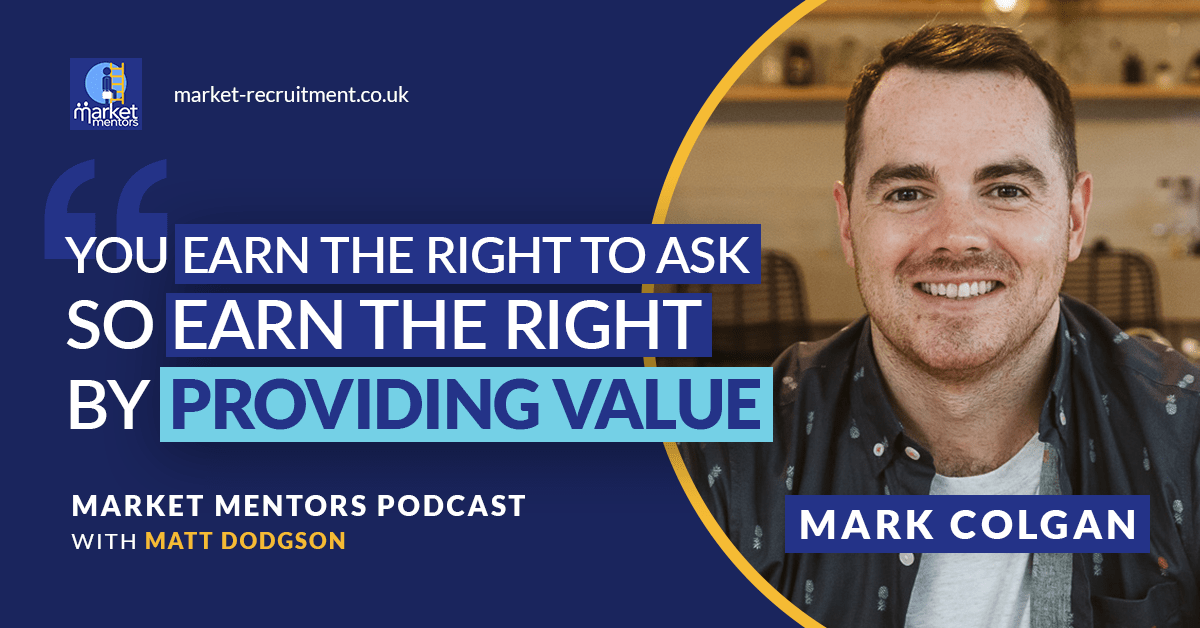
To be successful with your content marketing strategy these days, it’s essential that you create high quality content that your buyers really care about.
Why? Well, that’s exactly what this week’s guest has joined us to discuss.
In this episode of the Market Mentors Podcast, Mark Colgan talks to Matt Dodgson about the tactics and techniques he uses to create content that buyers actually care about.
Who they are: Mark Colgan, Co-Founder and CEO of Speak on Podcasts.
A bit of background: Mark started his career in recruitment, and has since gained 13 years of experience in B2B sales and marketing. Mark is currently based in Lisbon, and also provides outbound prospecting coaching to businesses.
Where you can find him:
Here you’ll find some of the best advice from the podcast that you can easily digest and learn from.
With such an overload of information on the Internet today, marketers must go above and beyond to ensure their message reaches their target audience.
When you also consider the fierce competition marketers in the B2B tech space have to deal with, it becomes even more important to ensure your content stands out from the crowd.
And Mark believes that simply churning out a few high-level blog posts each month, for the sake of volume, is no longer an option.
To be successful, your content must help your target audience learn something new or solve a specific challenge. In other words, you need to produce content that your buyers will actually care about.
Mark said, “There are so many companies just creating generic and bland podcasts which tick the boxes, because they’ve been told to or because they’ve committed to writing three or four blog posts a month. I skim read a lot of content, and if it’s just very high-level, I’ve just thought, this is not good. I’ve not learned anything, and it isn’t helping me do my job better. Whereas the companies that really focus on the challenges that their prospects have are more effective.”
It’s also vital that you’re producing content which goes beyond the product or service you’re trying to sell. By providing helpful information to your target audience across a broad range of topics, you give them more reasons to continue engaging with your brand organically.
Mark continued, “Take you, for example, Matt. If you only spoke about recruitment, for a Chief Marketing Officer, recruitment isn’t the only problem they have in their role. So, really focusing on the wider picture, and demonstrating that you understand the challenges that they’re in, allows them to build a relationship with you as a company and you as an individual.”
“Essentially, what you’re trying to do is become their trusted advisor,” added Mark. “So that when they do have a challenge, let’s say it’s specifically for recruitment, then they’ll think of you.”
“The type of content comes down to the people you’re trying to sell to and to market to,” said Mark. “Depending on who they are and where they are, there might be some specific channels that you want to follow.”
So, it’s important to first understand who your audience is, what topics they’re interested in, what challenges they’re looking to solve, and what channels you can reach them through.
Once you’re clear on those key points, Mark outlined a helpful technique to get as much value as possible from your content creation – strategic repurposing.
Mark said, “For example, what you could do is speak on podcasts about a topic. Then, once you’ve spoken about a topic for 30 minutes, you’ve got around a 5,000-word script. So, you can take that audio and turn it into written blog pieces. That might give you three 1,000-word blog posts.”
“Then you’ve got some long-form text-based content, which you could then further repurpose down into social media posts. If the podcast has been video recorded, you can also create small video snippets from it. If it’s just audio, you can also create things called audiograms. So, there’s lots of ways that you can do it.”
Of course, Mark reiterated that you should always prioritise the types of content your prospects are most interested in consuming, and invest your efforts into those areas.
Mark identified a few key mistakes marketers often make when it comes to creating content:
As we’ve already touched on the first mistake earlier in this article, let’s take a closer look at the other two here.
Mark said, “A lot of people overthink it, and a lot of people put pressure on themselves to be the ones that have to write all the copy. But if you’re not the domain expert in your business, use the people in your business who are domain experts.”
It’s always useful to reach out to the people in your organisation who are experts – whether they’re from the product team or the sales team, or even your CEO – and leverage their knowledge to take some of the burden of content creation off your own shoulders.
You’ll then be equipped with insightful, relevant material, which you can turn into content to be used across a range of formats or channels.
This will save you time on research and writing, allowing you to focus more on the distribution of the content to ensure it reaches your target audience. It will also improve the quality and credibility of the content, as the information will have come directly from an expert.
“That’s probably the most efficient way to create some content these days,” said Mark.
Subscribe to our fortnightly newsletter to hear about our latest podcasts, blogs, career advice & jobs.